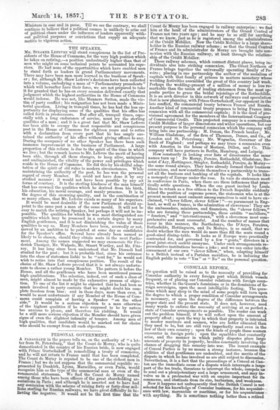THE SPEAKER.
MR. &Enna LEFETRE will stand conspicuous in the list of Presidents of the House of Commons, for the very high position which he takes on retiring,—a position undoubtedly higher than that of men who might on some technical points be accounted his superiors. He had none of the opportunities which have enabled men to stand forth as leaders in grand Parliamentary movements. There may have been men more learned in the business of Speaker; for, although Mr. Shaw Lefevre's decisions have been collected into a volume, embodying a mass of "Parliamentary preoedents " which will hereafter have their force, we are not prepared to take it for granted that he has on every occasion delivered exactly that judgment which the highest authorities in the House of Commons would indorse. He was not, like Manners Sutton, made the victim of party conflict; his resignation has not been made a Ministerial question. Living in tranquil times, he has had the less opportunity for displaying some of the qualities that his office has called forth in predecessors. But after all, tranquil times, especially with a long endurance of service, must try the sterling qualities of a man ; and it is a great feet that Mr. Shaw Lefevre has been able to occupy the most responsible and conspicuous post in the House of Commons for eighteen years and to retire with a declaration from every part that he has amply sustained the authority of his office without giving offence to any. During the occupancy of no other Speaker has there been such immense improvement in the business of Parliament. A large proportion of this reform is due to the spirit of the time in which we live ; but the remark leaves to Mr. Lefevre the merit of having been able, through all these changes, to keep alive, uninjured and undiminished, the vitality of the power and privileges which reside in the House of Commons. He did this by his skilful adaptation of the spirit of old rules to modern circumstances. While maintaining the authority of the post, he has won the personal regard of every Member. He could not have done it by any studied manner ; it would not have been possible by any set forms of courtesy. It is the sterling kindness of the man himself that has crowned the qualities which he derived, from his birth, his education, his moral courage, and manly presence. It is in the degree of this crowning quality, and in the combination of so many, others, that Mr. Lefevre excels so many of his superiors.
It would be most desirable if the new Parliament should appoint to the same post a man of the same mould. It will not be easy to match the retiring Speaker, but perhaps it will not be impossible. The qualities for which he was most distinguished are qualities which may be possessed in a certain degree by many English gentlemen, and it is not diminishing the value of those qualities to say so. Many Members have been, avowedly or not, moved by an ambition to be pointed at some day as candidates for the Speaker's office. Several have already been named as likely to be chosen, should they obtain seats in the next Parliament. Among the names suggested we may enumerate Sir Frederick Thesiger, Mr. Walpole, Mr. Stuart Wortley, and Mr. Fitzroy. It has long since been understood that Mr. Disraeli had studied for the post ; but it is probable that, since his entrance into the class of statesihen liable to be "sent for," he would not wish to retire into that conspicuous position. The result of the choice of Mr. Shaw Lefevre proved that it is not always unfortunate to choose a rather young Member. The pattern is before the House, and all the gentlemen who have been mentioned possess high qualifications. The selection, indeed, out of such a class of men, might almost be made by the exhaustive process of objection. To one of the list it might be objected that he had been so ranch involved in party contests that we might doubt his complete freedom from bias ; and, in these days, more than ever, it would be most unfortunate if any Member of the House of Commons could complain of having a Speaker "on the other side." It would be a serious objection to a man otherwise of the highest qualities if he were supposed to be by nature too anxious to please, and therefore too yielding. It would be a still more serious objection if the Member should have given signs of even the slightest infirmity of temper. Among men of high qualities, that candidate would be marked out for choice who should be exempt from all such objections.


































 Previous page
Previous page